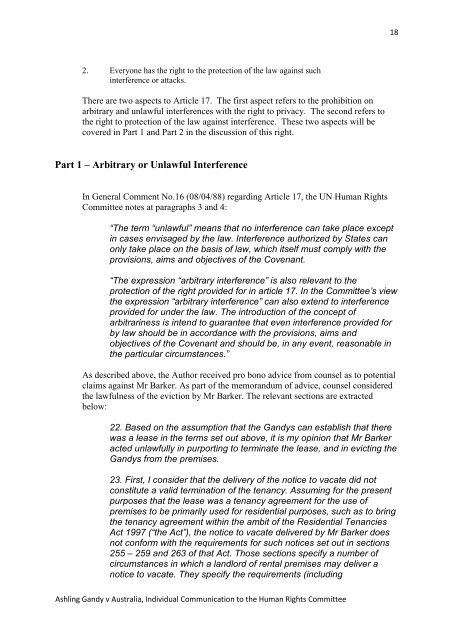individual communication to the united nations ... - Community Law
individual communication to the united nations ... - Community Law
individual communication to the united nations ... - Community Law
You also want an ePaper? Increase the reach of your titles
YUMPU automatically turns print PDFs into web optimized ePapers that Google loves.
182. Everyone has <strong>the</strong> right <strong>to</strong> <strong>the</strong> protection of <strong>the</strong> law against suchinterference or attacks.There are two aspects <strong>to</strong> Article 17. The first aspect refers <strong>to</strong> <strong>the</strong> prohibition onarbitrary and unlawful interferences with <strong>the</strong> right <strong>to</strong> privacy. The second refers <strong>to</strong><strong>the</strong> right <strong>to</strong> protection of <strong>the</strong> law against interference. These two aspects will becovered in Part 1 and Part 2 in <strong>the</strong> discussion of this right.Part 1 – Arbitrary or Unlawful InterferenceIn General Comment No.16 (08/04/88) regarding Article 17, <strong>the</strong> UN Human RightsCommittee notes at paragraphs 3 and 4:“The term “unlawful” means that no interference can take place exceptin cases envisaged by <strong>the</strong> law. Interference authorized by States canonly take place on <strong>the</strong> basis of law, which itself must comply with <strong>the</strong>provisions, aims and objectives of <strong>the</strong> Covenant.“The expression “arbitrary interference” is also relevant <strong>to</strong> <strong>the</strong>protection of <strong>the</strong> right provided for in article 17. In <strong>the</strong> Committee’s view<strong>the</strong> expression “arbitrary interference” can also extend <strong>to</strong> interferenceprovided for under <strong>the</strong> law. The introduction of <strong>the</strong> concept ofarbitrariness is intend <strong>to</strong> guarantee that even interference provided forby law should be in accordance with <strong>the</strong> provisions, aims andobjectives of <strong>the</strong> Covenant and should be, in any event, reasonable in<strong>the</strong> particular circumstances.”As described above, <strong>the</strong> Author received pro bono advice from counsel as <strong>to</strong> potentialclaims against Mr Barker. As part of <strong>the</strong> memorandum of advice, counsel considered<strong>the</strong> lawfulness of <strong>the</strong> eviction by Mr Barker. The relevant sections are extractedbelow:22. Based on <strong>the</strong> assumption that <strong>the</strong> Gandys can establish that <strong>the</strong>rewas a lease in <strong>the</strong> terms set out above, it is my opinion that Mr Barkeracted unlawfully in purporting <strong>to</strong> terminate <strong>the</strong> lease, and in evicting <strong>the</strong>Gandys from <strong>the</strong> premises.23. First, I consider that <strong>the</strong> delivery of <strong>the</strong> notice <strong>to</strong> vacate did notconstitute a valid termination of <strong>the</strong> tenancy. Assuming for <strong>the</strong> presentpurposes that <strong>the</strong> lease was a tenancy agreement for <strong>the</strong> use ofpremises <strong>to</strong> be primarily used for residential purposes, such as <strong>to</strong> bring<strong>the</strong> tenancy agreement within <strong>the</strong> ambit of <strong>the</strong> Residential TenanciesAct 1997 (“<strong>the</strong> Act”), <strong>the</strong> notice <strong>to</strong> vacate delivered by Mr Barker doesnot conform with <strong>the</strong> requirements for such notices set out in sections255 – 259 and 263 of that Act. Those sections specify a number ofcircumstances in which a landlord of rental premises may deliver anotice <strong>to</strong> vacate. They specify <strong>the</strong> requirements (includingAshling Gandy v Australia, Individual Communication <strong>to</strong> <strong>the</strong> Human Rights Committee
















